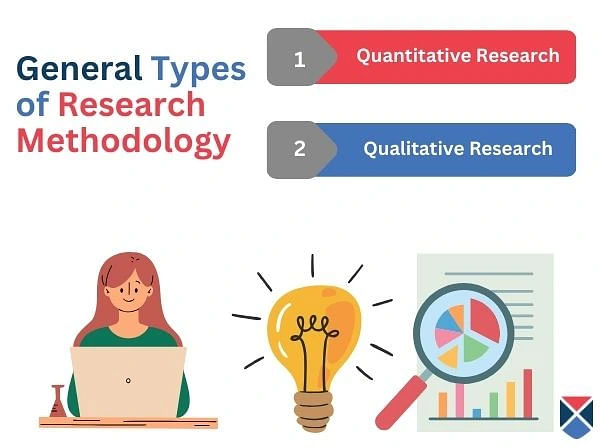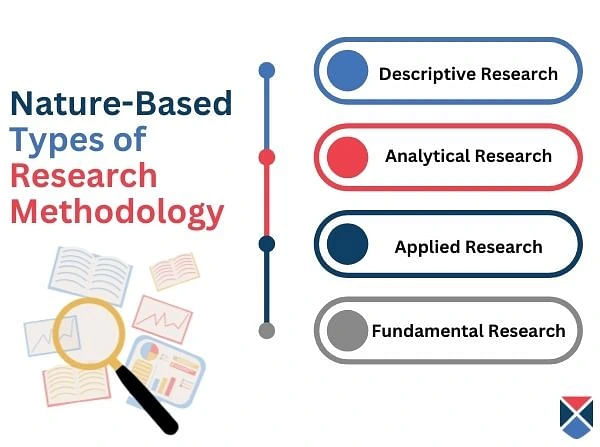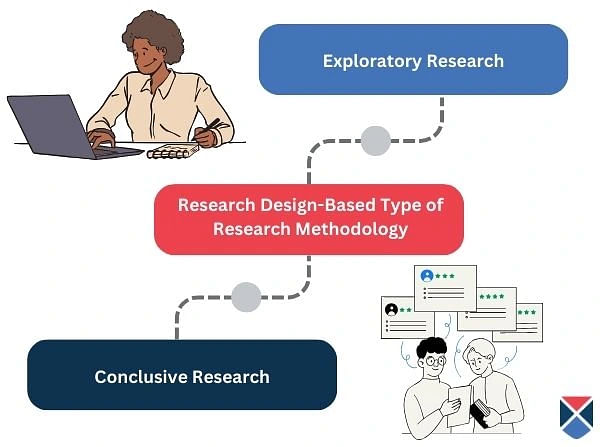Types of research methodology include various research techniques like surveys, case studies, etc., to achieve a desired outcome within a stipulated deadline.
Table of Contents
Types of research methodology for students include surveys, case studies, interviews, observations, data analysis, etc. Types of research methodology refer to the various research methods and techniques applied by candidates to conduct effective research.
The purpose of various types of research methodology is to ensure that the study's objectives and aims are achieved. The research student is accountable for introducing an idea and explaining it through a type of research methodology.
General Types of Research Methodology

There are two main types of research methodologies, namely qualitative and quantitative research methodology. Students can go through the two types of research methodology below.
1. Quantitative Research
Quantitative research is among the types of research methodology where quantitative data relies on quantifying a specific amount. It concentrates on gathering and analysing numerical data and can be used to seek averages and ways to predict outcomes.
Quantitative research methodology is a research technique that draws a conclusion using tables, facts, and graphs.
Pros Of Quantitative Research Methodology:
- Quantitative research can analyse large data through findings and assist in drawing broader judgments about the topic.
- Quantitative research uses surveys and experiments in real-time data collection. Thus, there are minimal delays in gathering the data under study.
- In Quantitative Data analysis, researchers can analyse information faster compared to other types of research methodology.
Cons Of Quantitative Research Methodology:
- In some cases, the researcher will not be able to conduct the research in the natural environment. The research can appear artificial and regulated.
- The quantitative research method is very limited and cannot dive in depth to identify behaviours, attitudes, and motives.
- Quantitative research methodology is very costly, and not everyone can afford it.
2. Qualitative Research
Qualitative refers to the non-numerical components of research. Qualitative research helps the researcher to grasp the information or data regarding a theoretical database. Besides, Qualitative Research enables the form of a better outline of theories in data.
Qualitative research is mostly involved in finding out the motivating factors behind human behaviour. Qualitative research allows us to understand the variables in research theory data.
Pros of Qualitative Research:
- Qualitative research utilises small data, resulting in quicker research studies.
- Social scientists can efficiently gather data from participants using this framework, resulting in a generalisation that will be helpful to the general public.
- It encourages a more in-depth inquiry into attitudes and behaviour.
- It permits flexibility in research to attain desirable outcomes.
Cons of Qualitative Research:
- The participants in the research can have a one-centred perspective, which doesn't provide a variety of outcomes to analyse.
- It is a very time-consuming research methodology as the data selection will be based on the researcher's perspective of thinking.
- In terms of sensitive research topics, often, the participant can be hesitant to share information and get insecure regarding their privacy.
Also Check: 10 Prioritization Techniques for Student Productivity
Nature-Based Types of Research Methodology

Apart from the major types of research methodology, there are various other types of nature-based research methods. The types of methodology based on the nature of the research are mentioned below.
1. Descriptive Research
Descriptive research is a research method that outlines the features of the issues under examination. This type of methodology concentrates more on the “what” of the research issue rather than the “why.” In this method, the researcher cannot control the variables but can only report the facts precisely.
Descriptive research includes observations, surveys, and case studies. It allows researchers to use many variables in research to explain the facts regarding the topic.
2. Analytical Research
Analytical research utilises proven facts to form the foundation for the research. Researchers frequently study to find supporting data that supports and establishes their earlier findings. Also, it assists in developing new concepts linked to the research subject. Thus, analytical research incorporates minute details to assemble more tenable hypotheses. It usually focuses on why a particular claim on the subject is valid.
3. Applied Research
Applied research is also known as action research because students usually study one domain and generalise research findings. It aims to solve a recent issue and often forecasts possible solutions to the problem. Applied Research is regarded as a non-systematic inquiry to address certain issues.
4. Fundamental Research
Fundamental research is usually concerned with formulating a theory and generalisations. It aims to discover facts with various applications, augmenting the ideas already existing in a specific domain. It focuses on changing traditional things or developing something new.
Research Design-Based Type of Research Methodology

Research Design-based Research methodology are usually of two types, i.e., Exploratory & Conclusive Research. Students can go through the two research design-based research methods stated below.
1. Exploratory Research
Exploratory research consists of theories and their explanations. Its objective is only to investigate the study questions, not to deliver definitive and conclusive resolutions to a problem. Exploratory research aims to improve the audience's understanding of the problem rather than offering definite proof.
This research type consists of improper topics, and there is a flexible & investigative approach to conclude. The research findings are usually a related topic, which enables enhancement of the research.
2. Conclusive Research
Conclusive research has a clear plan in the procedure and intends to respond to the research question. A well-thought-out design helps develop and solve the theories while delivering the results. The outcome of this type of research is usually generic.
Conclusive research establishes objectives and data requirements as conclusive research findings with a specific intent. A conclusive research design will involve quantitative techniques of data collection and findings analysis.
Also Check: 6 Coping Strategies For Student Mental Health
Tips to Choose the Right Type of Research Methodology
Various types of research methodologies can be used in academic research. Yet, students must look out for the reasons before finalising a research methodology for their topic.
- Research well on the topic and try to find out the expected or desired outcome of the research.
- Talk to your project mates to understand the concept that is required to be highlighted.
- Choose a research methodology that is most relevant to the topic.
- Try to stick to the types of research methodology that will deliver the best results in the short period.
- Students must set a clear objective regarding their research, their target audience, and their expected outcome to gain a desired outcome.
- Get acquainted with the methodologies that the research will include before finalising the research procedure.
- The research methodology should have a proper structure to attain the outcome; therefore, students should have clarity regarding the process.
Advantages of Using Research Methodology
There are numerous advantages of applying various types of research methodology to attain results in research. Students can go through the advantages of using the research methodology stated below.
- Different research methodologies assist in attaining the aim of the research. It provides verification and fact-checking, which is vital in a critical evaluation.
- Various types of research methodology present different perspectives on a matter, which gives a variety of results to analyse.
- Numerous types of research methodologies include quantitative methods that help obtain numerical statistics regarding research hassle-free.
- Qualitative methods of research allow students to dig deeper into the subject and study different behavioural patterns.
- The different methods help validate the research and improve its reliability while helping in generalising a variety of responses.
- Numerous types of research methodologies allow students to learn a lot while actively participating in the subject matter.
Also Check: Skill Development Courses List for Students 2023























POST YOUR COMMENT